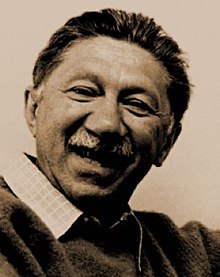Maslow, Abraham

Bio: (1908–1970) American psychologist. Abraham Maslow got his Ph.D. in psychology, at the University of Wisconsin, and after that worked at Columbia University, Brooklyn College, and Laughlin Institute in California. Maslow was initially trained within the behaviorist tradition, but later abandoned it and developed his approach of humanistic psychology. His work influenced many disciplines - education, marketing, management, psychology, sociology, and communications.
Maslow is most famous for his theory of the „hierarchy of human needs“, which he first introduced in the article in “A Theory of Human Motivation” (1943), and elaborated further in the book Motivation and Personality (1954). This theory states that human needs have to be satisfied in a specific tiered sequence, with biologically innate priority to first satisfy lower-lever needs, before motivation to satisfy higher-level arises. This hierarchy of needs is the same for all humans and the sequence of needs is as follows: 1) physiological needs – air, food, water, shelter, sex, and sleep; 2) personal safety needs – physical, psychological safety, the safety of family, property, and employment; 3) love needs (later changed the name to “belongingness”) - affection and a sense of belonging; 4) self-esteem needs - self-respect and the respect of others; and 5) self-actualization. Self-esteem needs are divided into two sub-needs: (1) the need for achievement, strength, and adequacy; and (2) the need for reputation, prestige, recognition, attention, and appreciation.
Maslow argued that higher-order needs are appearing later, both in evolutionary development and in an organism’s development. Maslow believed that people are innately inclined to achieve “self-actualization” which he defines as the need for an individual to achieve what he or she was meant to do or be. When people achieve self-actualization they enter into a more enlightened existence that he called eupsychia.
Maslow focused his research on personality syndrome—an interdependent, organized, and structured group of syndromes. Maslow states that psychological problems are caused by difficulty in fulfilling both lower and higher needs. To achieve self-actualization in patients therapists who follow humanistic psychology need to correct inaccurate views in patients of themselves and improve their self-esteem.
Maslow also studied leadership theory, organizational change, dominance, and sexuality.
Fields of research
Body Domination Emotions Evolution Health Human Nature Identity Instincts Knowledge Leaders Management Motivation Pathology, Social Personality Psychology Religion Sex SocializationTheoretical approaches
Humanistic PsychologyMain works
Principles of Abnormal Psychology (1941);
“A Theory of Human Motivation”, in Psychological Review (1943);
“Volunteer-error in the Kinsey study”, in Journal of Abnormal and Social Psychology (1951);
Motivation and Personality (1954);
New Knowledge in Human Values (1959);
Toward a Psychology of Being (1962);
Religion, Values and Peak Experiences (1964);
Eupsychian Management: A Journal (1965);
The Farther Reaches of Human Nature (1971);

